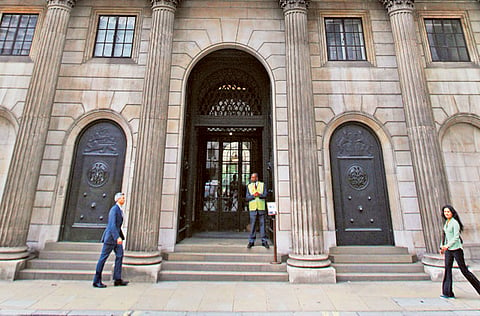Involvement in Libor scandal could cost Bank of England official dear
Oversight in rigging row could cost Bank of England deputy governor dear

London: Bank of England (BOE) Deputy Governor Paul Tucker’s account of his involvement in the Libor scandal stoked new criticism of the bank’s oversight failures as he struggles to stay in contention for its top job next year.
Tucker told lawmakers on Parliament’s Treasury Committee on Tuesday that he didn’t follow up concerns about Libor rates in 2007 because it looked at the time like a “dysfunctional” market, not a “dishonest” one. Barclays Plc was fined a record amount last month for manipulating Libor from as early as 2005.
“My concern is that the BOE clearly couldn’t see the wood for the trees,” committee member Andrew Leadsom said in an interview after Tucker’s testimony in London. “The amount of talk there was about Libor, it’s slightly incredible that a central banker didn’t see it as something to investigate.”
As Parliament debates the bill that will hand the Bank of England control of financial regulation in the UK, Tucker was drawn into the Libor scandal over a 2008 conversation he had with former Barclays chief executive officer Robert Diamond. The issue has jeopardised his chances of replacing Mervyn King as governor of the Bank of England next year.
Tucker is “an honest individual and he probably regrets that he didn’t read the signals better when they were coming through,” lawmaker Mark Garnier, a member of the Treasury Committee, said of the Libor manipulation. While Tucker as governor is “certainly on the cards,” there is now a “hump he’s got to get over.”
Alarm bells
Barclays’ chairman Marcus Agius will attend the panel today at 10am. Diamond, who resigned last week, testified on July 4.
Asked about a November 2007 meeting of bankers and regulators he led, where the issue of false Libor rates was raised, Tucker said it “didn’t set alarm bells ringing" and it didn't appear to him to reflect lowballing by banks.
“It may well be in hindsight, but that is not how we understood it at the time,” he said.
“This doesn’t look good, Mr. Tucker,” Committee chairman Andrew Tyrie said. “It doesn’t look good that we have in the minutes on the November 15, 2007 what appears to any reasonable person to be a clear indication of lowballing about which nothing was done.”
Libor is calculated by a survey of banks’ daily estimates of how much it would cost them to borrow from one another for different time frames and in different currencies. Tucker said responsibility for the benchmark lies with the British Bankers’ Association (BBA) rather than the Bank of England, adding that he would prefer to see it based on actual transactions.
‘Cesspit’
Tucker’s two-hour testimony before the panel followed the £290 million (Dh365.87 million) fine imposed on Barclays. The UK Serious Fraud Office said on July 6 that it has opened a criminal probe, while Tucker yesterday described the scandal as a “cesspit” that raises questions about the credibility of other indexes that are based on banks’ estimates.
“I can’t be confident about anything after learning about this, this cesspit,” he said. “Self-certification is plainly open to abuse” and the government “should look at every single index that isn’t based on real transactions.”
Tucker was questioned at the hearing about a memo written by Diamond after an October 29, 2008 phone conversation between the two men. The note suggested Tucker might have hinted that Barclays could lowball its Libor submissions.
According to the memo, Tucker had received calls from “senior” government figures on Barclays’ Libor pricing. Diamond said Tucker stated “that while he was certain we did not need advice, that it did not always need to be the case that we appeared as high as we have recently.”
‘Wrong impression’
Tucker, who was markets director at the central bank at the time, said that sentence in the note “gives the wrong impression.” He said he spoke to Diamond as there were worries Barclays was “next in line” after Royal Bank of Scotland Group Plc and Lloyds Banking Group Plc had accepted government bailouts in 2008.
Tucker told the committee that the central bank hadn’t kept a record of the call. “Sitting here, I greatly wish there were a note of it,” he said.
Leadsom queried the central bank’s procedures and its diligence in keeping records during the early days of the crisis. Tucker said it was an “extraordinary time” and the financial world was “falling apart” in the period of the Diamond phone call.
“It was an extraordinary time, but he’s saying we were too busy to follow our procedures,” Leadsom said. “Surely a crisis is when it’s most important you follow procedures.”
Government contacts
Odds on bookmaker Paddy Power Plc’s website yesterday show Tucker is no longer the favourite to take over from King in 2013. His odds have worsened to 9/4 from 6/4, while Gus O’Donnell, the former head of the UK civil service, moved to 7/4 from 2/1. O’Donnell was a 14/1 shot at the start of the year.
During his testimony last week, Diamond said that he didn’t interpret the 2008 conversation with Tucker as a request to change Barclays’ Libor submissions. Tucker said yesterday he wasn’t leaning on Barclays to lowball the rates.
Tucker’s evidence puts pressure on Chancellor of the Exchequer George Osborne, who last week accused his opposite number in the Labour Party, Ed Balls, of being involved in the scandal as a Cabinet minister in the previous government. The allegation sparked angry exchanges in the House of Commons.
“It is now absolutely clear that the chancellor’s allegations last week were totally false and completely without foundation,” Balls said yesterday. “George Osborne should now publicly withdraw these false allegations and apologise.”
Sign up for the Daily Briefing
Get the latest news and updates straight to your inbox



